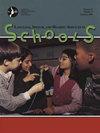认识和抵制学校中的歧视性语言:给校内言语治疗师和相关专业人员的建议》。
IF 2.9
3区 医学
Q1 AUDIOLOGY & SPEECH-LANGUAGE PATHOLOGY
Language Speech and Hearing Services in Schools
Pub Date : 2024-10-07
DOI:10.1044/2024_lshss-24-00036
引用次数: 0
摘要
目的学校专业人员在描述残疾学生时所使用的语言会揭示并延续能力主义假设。专业人员的语言选择也可以挑战残障态度,帮助创建更具包容性、更公平的学习环境。本教程旨在指导言语病理学家(SLPs)和其他学校专业人员识别残障语言,理解这些语言所揭示的残障意识形态,并制定策略,以反残障主义的立场与残障学生沟通。我们简要介绍了学校中的残障主义,描述了残疾模式及其与残障主义意识形态的不同一致性,并指出了语言反映和延续残障主义的方式。以个别化教育计划目标为例,我们研究了学校实践中可能出现的残障语言。最后,我们提供了一些建议,以指导语言康复师和其他学校专业人员检查并改变他们的语言,从而更好地与反残疾主义立场保持一致。虽然消除残障主义需要系统性的改变,但我们建议专业人员个人可以通过使用语言的方式来抵制残障主义,并对学生的教育经历产生强有力的影响。本文章由计算机程序翻译,如有差异,请以英文原文为准。
Recognizing and Resisting Ableist Language in Schools: Suggestions for School-Based Speech-Language Pathologists and Related Professionals.
PURPOSE
The language that school professionals use to describe disabled students can reveal and perpetuate ableist assumptions. Professionals' language choices can also challenge ableist attitudes to help create more inclusive, equitable learning environments. This tutorial seeks to guide speech-language pathologists (SLPs) and other school professionals to identify ableist language, understand the ableist ideologies that such language reveals, and develop strategies to implement ways of communicating with and about disabled students that align with an anti-ableist stance. We offer a brief description of ableism in schools, describe models of disability and their varying alignments toward ableist ideologies, and identify ways in which language can reflect and perpetuate ableism. Using Individualized Education Program goals as an example, we examine the ways in which ableist language can manifest in school practices. Finally, we provide suggestions to guide SLPs and other school professionals to examine and change their language to better align with an anti-ableist stance.
CONCLUSIONS
School professionals' language use is not neutral and may reveal and maintain ableist assumptions about disability and disabled students. While dismantling ableism requires systemic change, we suggest that individual professionals can use language in ways that resist ableism and powerfully impact their students' educational experiences.
求助全文
通过发布文献求助,成功后即可免费获取论文全文。
去求助
来源期刊

Language Speech and Hearing Services in Schools
Social Sciences-Linguistics and Language
CiteScore
4.40
自引率
12.50%
发文量
165
期刊介绍:
Mission: LSHSS publishes peer-reviewed research and other scholarly articles pertaining to the practice of audiology and speech-language pathology in the schools, focusing on children and adolescents. The journal is an international outlet for clinical research and is designed to promote development and analysis of approaches concerning the delivery of services to the school-aged population. LSHSS seeks to advance evidence-based practice by disseminating the results of new studies as well as providing a forum for critical reviews and meta-analyses of previously published work.
Scope: The broad field of audiology and speech-language pathology as practiced in schools, including aural rehabilitation; augmentative and alternative communication; childhood apraxia of speech; classroom acoustics; cognitive impairment; craniofacial disorders; fluency disorders; hearing-assistive technology; language disorders; literacy disorders including reading, writing, and spelling; motor speech disorders; speech sound disorders; swallowing, dysphagia, and feeding disorders; voice disorders.
 求助内容:
求助内容: 应助结果提醒方式:
应助结果提醒方式:


